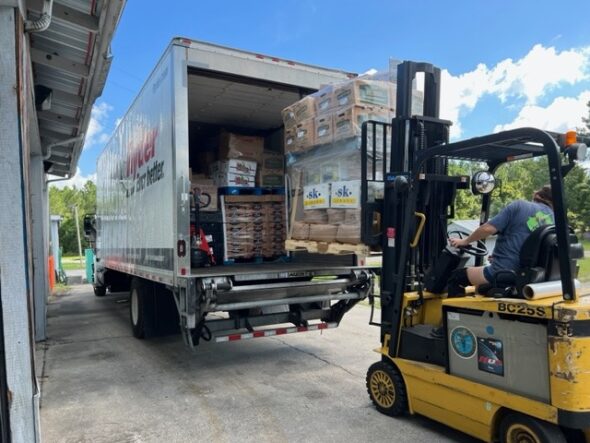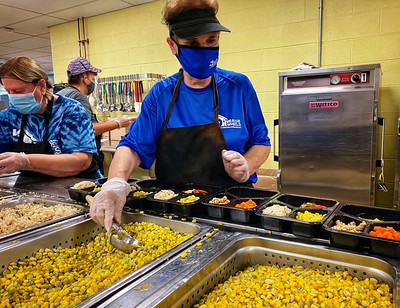By Chloe Smith
As food prices rise, the food insecurity rate among St. Johns County residents grows. Nonprofit leaders say senior citizens are most susceptible.
“It’s hard,” said Vickie Leese, a local senior and nonprofit volunteer, referring to her struggle to balance the increasing cost of food with other critical needs. “There’s times, even living where I live now — and I’ve never thought I would be in that place — that I have to decide, ‘Can I get that medicine?’”
Even though the issue is more than critical, food insecurity in St. Johns County is often hidden behind wealth, tourists and famous historical attractions.
“While this is one of the wealthiest counties in Florida, it doesn’t mean there’s not a lot of poverty,” said Sunny Mulford, executive director of the nonprofit Epic Cure.
In 2021, 5.5 million seniors were said to be food insecure, according to a report released by Feeding America.
As the senior population grows in Northeastern Florida, more aging adults face food insecurity, which the FAO defines as those who lack regular access to enough safe and nutritious food for growth, development and an active and healthy life.
“Inflation is going way up, and their social security payments aren’t getting any bigger. And then, you know, as you get older, the cost of medicine typically goes a lot higher,” Mulford said. “And then, you’re on that fixed income, and so, as your health declines … basically your costs go up.”
Through organizations such as Epic Cure, many food-insecure seniors in St. Johns County can receive free groceries and use their money for other necessities.
The local nonprofit is a 100% volunteer-run food bank and food pantry that eliminates food waste and combats food insecurity through food rescue and distribution.

“Currently, we rescue closer to 600,000 pounds of food a month, and we provide free groceries to about 2,200 families every week,” Mulford said.
Those age 60 and older comprise 27% of the St. Johns County population, and the percentage continues to increase, according to a 2021 report by the Florida Department of Elder Affairs.
“The population as a whole is definitely growing, and then a lot of our population are retirees from the north,” said Amy Robinson, development manager of the Council on Aging (COA) in St. Johns County. “Some of that population up north is families, but a lot of it is also senior citizens.”
In 2021, almost 20,000 food-insecure individuals comprised St. Johns County, with over half of the town’s population below the SNAP threshold of 200% poverty, according to Feeding America.
Inflation is the primary factor contributing to the senior food-insecure population.
“When you retire, you said, ‘Here’s our budget, and you can make it,’ but since I’ve retired … groceries have doubled. Gas has went up $1.45 more in two years,” Leese said.
According to the U.S. Bureau of Labor Statistics, the Consumer Price Index rose 3.2 percent over the last 12 months, the smallest 12-month increase since March 2021.
“You keep hearing on the news about how inflation is decreasing… it’s still increasing. It’s just increasing at a slower pace, but… the cost of everything is going up,” Mulford said.
From food and gas prices to home insurance rates and property taxes, inflation has made it extremely difficult for seniors- on either a single pension, fixed income, or are waiting on social security payments- to afford their current living.
“So many are talking with me about needing to get reverse mortgages in order just to continue living because their means has far extended their retirement funds,” Robinson said. “And they’re on a fixed income, and there’s not much that they can do beyond what they have.”
Similarly to Epic Cure, the COA St. Johns County is a private agency offering various programs to improve the lives of seniors and their caregivers.
Besides their Congregate Meal Site and Meals on Wheels programs, the COA has several other programs, such as Care Connection and Prescription Assistance, that indirectly fight food insecurity “by helping seniors not have to pay for some things that would limit their funds even further,” Robinson said.
For older adults, food insecurity is often linked to health, nutrition, and disability, leading to weight loss, plummeting blood sugar, muscle atrophy, weakness and fatigue, high blood pressure, and several other consequences.
“Food insecurity could contribute to increased risk of injury, broken bones, and such,” Robinson said. “It would amplify any of their current medical conditions, and then it just would also contribute to early unnecessary hospitalizations and or premature death.”
The American Associated of Retired Persons (AARP) Foundation reports the estimated healthcare costs resulting from food insecurity for seniors total more than $130 billion annually.
“I don’t think that people understand the impact that food insecurity can have,” Robinson said.
With aging adults, a sense of pride or dignity often gets in the way of asking for or receiving vital help.
“That population especially struggles with losing independence and then not wanting to admit that,” Robinson said. “That was also a generation taught not to complain, so they tend to hide the need that they have.”
Being one of the most robust Councils on Aging in Florida, the St. Johns County COA receives excellent support from its community.
“One of the things I love about St. John’s County and the St. Augustine community is how giving they are,” Robinson said. “We had a senior citizen that needed a refrigerator because she could not keep her meals safe through the weekend. You know, she had to use a cooler … we posted that on social media, and it was funded within five hours.”
However, the food-insecure senior population in St. Johns County has grown overwhelmingly, and organizations like the COA and Epic Cure require more support.
“As the problem around inflation increases, it’s going to be a much more prevalent conversation because the issue is becoming much bigger,” Mulford said, referring to food insecurity. “It’s going to have to be addressed somehow.”
For more information about the organizations mentioned above or how to support seniors experiencing food insecurity, visit https://www.epic-cure.org/ and https://www.coasjc.org



Be the first to comment on "Local nonprofit leaders fight food insecurity for senior citizens"